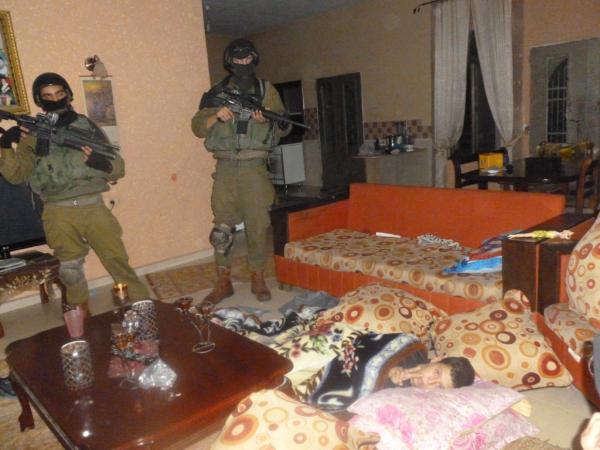There exists a general, intentional, cleverly constructed misunderstanding surrounding the true nature of the Israeli occupation. Some say it’s a simple dispute over land, like many others in the world; other think the conflict is about national independence for the Palestinians, prompting statements like, “The Basques and the Kurds aren’t independent either, so why do people pick on Israel?”
But the occupation is something else. It is the ongoing military control over the lives of millions, and everything that comes with it: The lack of civil rights, the absence of legal protection, and perhaps more than anything else, a sense of organized chaos, in which the lives of an entire civilian population is run at the mercy of soldiers 18 to 20 years old. Most of the time, it’s almost hard to explain how bad it is for those who haven’t seen it with their own eyes.
Joseph Dana posted this picture today, of a military raid on the home of an imprisoned Palestinian activist in Nabi Saleh. This is a non-story in the West Bank: The army enters Palestinian homes as it pleases, day or night. No warrant is needed, just like you don’t need a warrant to arrest a Palestinian (even a minor). Once the soldiers are in the house, the nature of the interaction between them and the family living there depends on their good or ill will – and in the 44 years of the occupation, we have had everything: from “polite” visits, to beatings and cursing, all the way up to the murder of civilians in their beds. A Palestinian is never safe – not even in his own home. He can never know what’s coming, the way most of us can even during unpleasant encounters with the authorities. The important point is that both the Palestinian and the soldier know that.
To illustrate this issue, here is a video from a couple of weeks ago. It was taken in Nabi Saleh, the same village where the picture above was taken. The soldiers enter a man’s house at night, and demand he wakes up his children, so they can take their pictures in order to keep them for identification in case of stone-throwing. I think that it is the calmness of the entire scene, the fact that the soldiers are polite and that nothing “horrifying” happens, which makes this video truly shocking.
[youtube]http://www.youtube.com/watch?v=-jnb6z5HZ34&[/youtube]
You can say that everything is okay, as many Israelis would. But you can also ask yourself – why do the soldiers come at night? Or why do they come at all? After all, you don’t normally take people’s photos in the event they might be involved in illegal activities. And from there, you can also start questioning the whole logic of a permanent situation in which the army runs civilians’ lives.
I wonder what is the real effect of this scene, on all parties involved: The kids who are being awakened in the middle of the night; the humiliated father; the soldiers, who know that they can do whatever they want to this man and his family. And what is the effect of this scene taking place again and again and again, for 44 years?
Most important is to truly ask ourselves whether we can imagine the same thing happening to us, the same army visit taking place in our home. Would we respond so calmly? Probably not, because we have a different understanding of our existence than the Palestinians and soldiers in this clip. In many ways, we live in a different world.
————–
* Bare life: A term associated with the work of Italian philosopher Giorgio Agamben, describing a state of existence outside the political and legal order, in which a person is stripped of all forms of protection.


